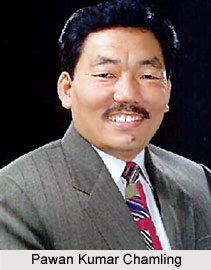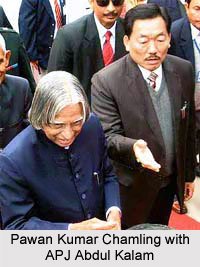 Pawan Kumar Chamling is the current and 5th Chief Minister of Sikkim. He is the founder member and also the president of the Sikkim Democratic Front (SDF) party. The Party has governed Sikkim for four consecutive terms from 1994, and won the 1994, 1999, 2004 and 2009 state assembly elections.
Pawan Kumar Chamling is the current and 5th Chief Minister of Sikkim. He is the founder member and also the president of the Sikkim Democratic Front (SDF) party. The Party has governed Sikkim for four consecutive terms from 1994, and won the 1994, 1999, 2004 and 2009 state assembly elections.
Early Life of Pawan Kumar Chamling
Pawan Kumar Chamling was born on 22nd September 1950, to the parents Aashbahadur Chamling and Aasharani Chamling in Yangang, South Sikkim. Chamling left his school after completing his studies till 4th standard. His school days started quite late. His formal education came to an end after matriculation. He was however, proficient in sports, cultural and literary activities in addition to academics.
Political Career of Pawan Kumar Chamling
Chamling earlier worked as a government contractor, he later joined politics in the year 1972. He built a number of roads, bridges, buildings and irrigation canals and served as a first-class contractor. Being a contractor, Pawan Kumar acquired adequate ideas about the practical issues that are involved in the grassroots development activities.
Pawan Chamling, at the age of 23, had already acquired his political soul. In 1977, Pawan Chamling`s political journey begun as he was the founder member and Vice- President of the Sikkim Prajatantra Congress in the state. The core political philosophy were guided by his extreme love for and understanding of the rural masses and the working people. The new era in Sikkim was introduced with the Cooperatives Movements in which Chamling was involved actively.
 Chamling remained in the post of secretary and president for a long time. In 1982 Pawan Kumar Chamling was elected as the president of Yangang Gram Panchayat. Chamling eventually emerged as an MLA and in 1985 became the Cabinet Minister in Charge of Information and Public Relations and Industries in the Nar Bahadur Bhandari cabinet. He emphasised on development of the rural areas of Sikkim. Pawan Kumar Chamling`s obsession with planning and planned development over the years became the key mark of his visionary leadership.
Chamling remained in the post of secretary and president for a long time. In 1982 Pawan Kumar Chamling was elected as the president of Yangang Gram Panchayat. Chamling eventually emerged as an MLA and in 1985 became the Cabinet Minister in Charge of Information and Public Relations and Industries in the Nar Bahadur Bhandari cabinet. He emphasised on development of the rural areas of Sikkim. Pawan Kumar Chamling`s obsession with planning and planned development over the years became the key mark of his visionary leadership.
Pawan Chamling was instrumental in establishing the Sikkim Democratic Front (SDF) on March 4th, 1993. it was set up with the intention of fostering democracy, justice, and development aspirations of the people. Chamling was unanimously elected as the President of the party. In the 1994 assembly elections, Chamling and his party won from Damthang and for the first time came into power. By winning 19 out of 32 seats, the Sikkim Democratic Front of Chamling swept the poll. They formed the government in December.
Pawan Kumar Chamling as an Author
Chamling remained equally active in literary and cultural activities. He established Nirman Prakashan in 1977, and began the publication of Nirman, a monthly literary magazine. Pawan Chamling is also a poet of the masses. Several books have been published by him, like Antahin Sapana Mero Bipana, Perennial Dream and my Reality, Damthang Heeja Ra Aajah, Sikkim Ra Narikoh Maryadhyaa, Democracy Redeemed, Meroh Sapana Koh Sikkim. He writes under the pen name Pawan Chamling Kiran.
Awards received by Pawan Kumar Chamling
Pawan Kumar Chamling has received several awards and honours through out his career. Some of the awards bestowed on him are Thekong Ambassador of Peace (2010) by the Pang Lhabsol Committee; Bhanu Puraskar (2010) by Sikkim Sahitya Parishad; Leadership and Good Governance Award (2009) by the Universal Peace Federation; Doctor of Philosophy (2003) by Sikkim Manipal University; Poets` Foundation Award (2002) by Poets Foundation, Kolkata; Manav Seva Purashkar (1999) by Institute of Economic Studies, New Delhi; Man of the Year (1998) by Biographical Institute, USA; Greenest Chief Minister of India (1998) by Centre for Science and Environment, New Delhi; Bharat Siromani (1996) by Shiromani Foundation, New Delhi; Chintan Purashkar (1987) by Sikkim Sahitya Parishad.






